裕兴新概念英语第一册笔记:Lesson 68 What's the time
裕兴新概念英语第一册笔记(完整版)
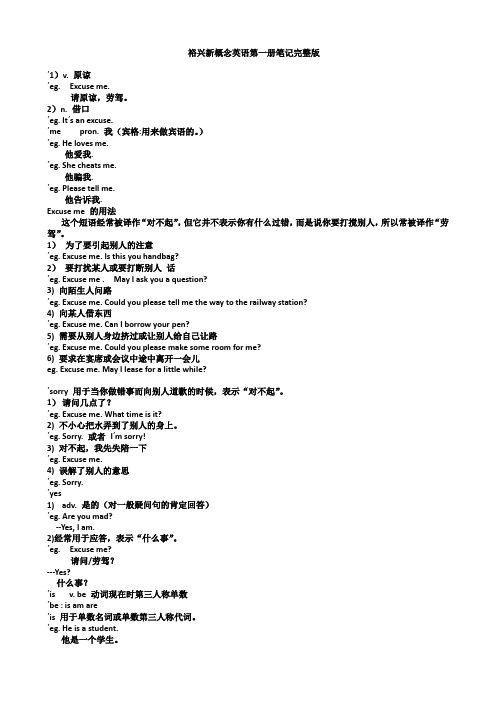
裕兴新概念英语第一册笔记完整版΄1)v. 原谅΄eg. Excuse me.请原谅,劳驾。
2)n. 借口΄eg. It΄s an excuse.΄me pron. 我(宾格:用来做宾语的。
)΄eg. He loves me.他爱我.΄eg. She cheats me.他骗我.΄eg. Please tell me.他告诉我.Excuse me 的用法这个短语经常被译作“对不起”,但它并不表示你有什么过错,而是说你要打搅别人,所以常被译作“劳驾”。
1)为了要引起别人的注意΄eg. Excuse me. Is this you handbag?2)要打扰某人或要打断别人话΄eg. Excuse me . May I ask you a question?3) 向陌生人问路΄eg. Excuse me. Could you please tell me the way to the railway station?4) 向某人借东西΄eg. Excuse me. Can I borrow your pen?5) 需要从别人身边挤过或让别人给自己让路΄eg. Excuse me. Could you please make some room for me?6) 要求在宴席或会议中途中离开一会儿eg. Excuse me. May I lease for a little while?΄sorry 用于当你做错事而向别人道歉的时候,表示“对不起”。
1)请问几点了?΄eg. Excuse me. What time is it?2) 不小心把水弄到了别人的身上。
΄eg. Sorry. 或者I΄m sorry!3) 对不起,我先失陪一下΄eg. Excuse me.4) 误解了别人的意思΄eg. Sorry.΄yes1)adv. 是的(对一般疑问句的肯定回答)΄eg. Are you mad?--Yes, I am.2)经常用于应答,表示“什么事”。
(完整版)新概念英语第一册课文
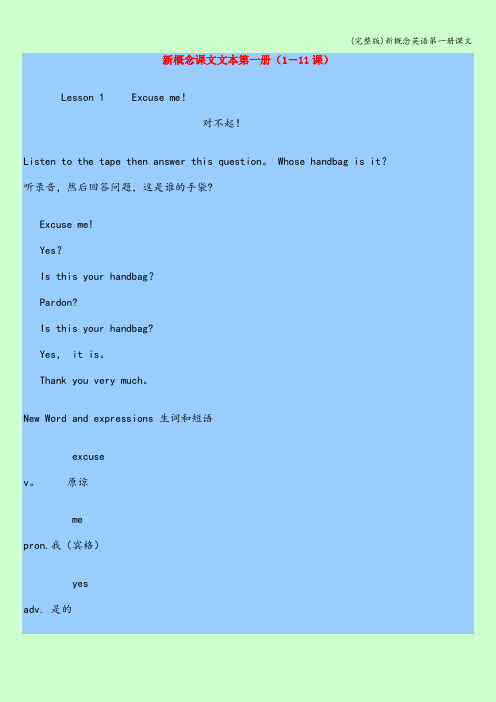
新概念课文文本第一册(1-11课) Lesson 1 Excuse me!对不起!Listen to the tape then answer this question。
Whose handbag is it?听录音,然后回答问题,这是谁的手袋?Excuse me!Yes?Is this your handbag?Pardon?Is this your handbag?Yes, it is。
Thank you very much。
New Word and expressions 生词和短语excusev。
原谅mepron.我(宾格)yesadv. 是的isv. be 动词现在时第三人称单数thispron.这yourpossessive adjective 你的,你们的 handbagn. (女用)手提包pardonint. 原谅,请再说一遍itpron.它thank you感谢你(们)very much非常地参考译文对不起什么事?这是您的手提包吗?对不起,请再说一遍。
这是您的手提包吗?是的,是我的。
非常感谢!Lesson 3 Sorry, sir.对不起,先生。
Listen to the tape then answer this question。
听录音,然后回答问题。
这位男士有没有要回他的雨伞? My coat and my umbrella please.Here is my ticket。
Thank you, sir。
Number five。
Here’s your umbrella and your coat.This is not my umbrella。
Sorry sir.Is this your umbrella?No, it isn't。
Is this it?Yes, it is。
Thank you very much.New words and Expressions 生词和短语umbrellan. 伞pleaseint. 请hereadv. 这里mypossessive adjective 我的ticketn。
新概念英语第一册L68

What’s the time?
基数词
one two three four five six seven eight nine ten eleven twelve
序数词
first second third four th fifth sixth seven th eighth nin th ten th eleventh twelf th
缩写
13th 14th 15th 16th 17th 18th 19th 20th
100
19th 13th 12th 15th
17th 18th
20th
14th
What the time?
It’s one o’clock.
What the time?
It’s five past one.
What the time?
Were you at school on Sunday, January 1st?
Yes, I was. / No, I wasn’t.
Were you at church on Sunday, January 1st?
Yes, I was. / No, I wasn’t.
Was she at church on Sunday, January 1st?
He wasn’t at school on January 1st. He was at school on January 1st.
Where were you on Sunday?
I was at church on Sunday.
When were you at church?
I was there on Sunday.
新概念英语第一册1—68课测试题

新概念英语第一册1—68课综合测试题听力部分一、听录音,补全单词。
(10分)HANS: Where do you come from?DIMITRI: I come from 1 __________HANS: What's the 2__________like in your country?DIMITRI: It's very 3 __________.HANS: What's the weather like in 4__________?DIMITRI: It's often windy in 5__________. It's always warm in April and May,but it 6__________ sometimes.HANS: What's it like in 7__________r?DIMITRI: It's always hot in June, July and August. The sun 8__________ every day.HANS: Is it cold or warm in autumn?DIMITRI: It's always warm in 9__________ and October.It's often cold in November and it rains sometimes.HANS: Is it very cold in winter?DIMITRI: It's often cold in 10__________, January and February. It snows sometimes.笔试部分一、词汇题:(20分)1、手提包__________2、票__________3、法国人__________4、家庭妇女__________5、今天__________6、脏的__________7、年轻的__________8、抓住__________9、颜色__________ 10、楼上__________ 11、朋友__________ 12、橘黄色的__________ 13、勤奋的__________ 14、办公室__________ 15、口渴__________16、重的__________ 17、空的__________ 18、瓶子__________ 19、刀子__________ 20、架子__________ 21、报纸__________22、厨房__________ 23、长裤__________24、信__________25、桥__________ 26、睡觉__________ 27、最喜欢的__________ 28、作业__________ 29、老板__________ 30、书写__________ 31、羔羊肉__________ 32、西红柿__________ 33、国家__________ 34、秋季__________ 35、季节__________ 36、有趣的__________ 37、话题__________ 38、呆在__________39、片刻__________ 40、零钱__________ 41、感觉__________ 42、药__________ 43、图书馆__________ 44、听见__________ 45、玩的快活__________46、星期三__________47、幸运的__________48、度过__________ 49、周末__________ 50、教堂__________51、pardon__________52、umbrella________53、German__________54、engineer_______ 55、nationality_______56、hairdresser_______57、perhaps_______58、blouse________ 59、smart________60、passport________61、tourist_________62、sales rep__________ 63、tired_______64、shut______65、sharp______66、spoon______67、magazine_______ 68、sweep________69、village______70、bookcase______71、vase______72、chocolate_________73、tobacco_______74、boil_______75、terrible________76、biscuit______77、fresh_________78、butcher_________79、peach_______80、beef______ 81、Spain_________82、arrive______83、assistant_______84、envelope_______85、chalk________86、remember________87、tongue________88、stomach_______89、temperature______90、remain______91、match______92、noise________93、absent______ 94、minute_________95、drop__________96、armchair________97、cooker________98、cupboard_________99、thin________100、busy________二、从A、B、C、D中选出划线部分的读音与其他三个不同的选项(5分)( )01.A.butcher B.husband C.butter D.summer( )02.A.meat B.pea C.steak D.bean( )mb B.cabbage C.January D.may( )04.A.climate B.windy C.winter D.Brazil( )05.A.truth B.either C.north D.south( )06.A.butcher B.chicken C.peach D.school( )07.A.cabbage B.egg C.August D.grape( )08.A.country B.house C.blouse D.hour( )09.A.snow B.brown C.flower D.how( )10.A.warm B.March C.car D.are三、选词填空(10分)A)piece bar loaf bottle pond quarter tin1 A_________of bread.2 A_________of milk.3 A_________of cheese.4 A_________ of tabacco.5 A_________of sugar.6 A_________past eleven.7 A_________of soap.B) put on turn on open shut take off turn off sweep air1 _______________the room2 _______________your shoes3 _______________the window4 _______________the floor5 _______________the TV6 _______________the light7 _______________the door 8 _______________your coatC) in、at、on、under1、Those books are ______the shelf.2、I have dinner ______ the evening.3、My father play basketball ________Sunday.4、They go fishing ______ weekends.5、There is a dog ________ the table.四、用所给动词的适当形式填空(15分)01.The boy_________(sit)under the tree now.02.Do you want_________(some)meat today?03.—What are you going to do?—I_____________(paint)the bookcase.04.He_________(like)spring best.05.It often_________(rain)in summer.06.—Where_____the girl_____(come)from?—She_________from Beijing.07.We are_________.We come from_________(Chinese,China).08.There are some_____________(policeman)in the park.09.Jim_________(not like)coffee,but he_________(like)tea.10.Look,the dog_________(run)aftera cat..11.Mr.Black goes to work on_________(foot)every day.12.The children always do_________(they)homework at night.13.She often_________(watch)TV in the evening,but now,she_________(read)the newspaper.14.Give that hammer ____________(me).15.I only have some small_____(box)五、按要求改写下面的句子(10分)1.There are some watches on the table.(改为否定句)___________________________________2.There is a knife in the box.(改为复句)___________________________________________3.There is an apple in the fridge.(对划线部分提问)___________________________________4.The boys do their homework after school(改为一般疑问句)____________________________________________________5.Mr. Zhang is my teacher.(对划线部分提问)_______________________________________6.what’s the time?(同义句)7._______________________________________7.This is Tim’s shirt.(对划线部分提问)_______________________________________8.The weather in my country is very pleasant.(对划线部分提问)_______________________________________9 at,moment,he,the,drinking,in,garden,tea,the,is,the(连词成句)____________________________________________________10 she,does,like,steak,not,either(连词成句)____________________________________________________六.为下列疑问句选择正确答语:(10分)( ) 1. Whose shirt is this? ( )2. Come and see my new bedroom. ( ) 3. Who is this young man? ( ) 4. What’s the matt er, children?( ) 5. Where are my magazines? ( ) 6. What are the children doing?( ) 7. Who are you going to see? ( ) 8. What are you going to do with those flowers? ( ) 9. Can you make the tea, Sam? ( ) 10.wh ere’s Pam ela?( ) 11 Do you want beef or lamb? ( ) 12 Is this your handbag, Alice?( ) 13 How are you today? ( ) 14 What’s your job?( ) 15 What colour are your new shoes? ( ) 16 What are their jobs?( ) 17 How do you do? ( ) 18 Where’s the teapot? I can’t see it. ( ) 19 What’s the weather like here in winter? ( ) 20 What nationality are you?a. It’s over there --- behind the kettle.b. We’re Chinese.c. No, my bag is blue.d. Yes, of course I can.e. Thank you, sir.f. Perhaps it is Tim’s.g. It’s cold and it rains a lot. h. They’re red.i. Neither, Mr Smith. j. I’m going to see Dan.k. I’m very well, thank you. l. How do you do?m. She’s next door. n. They’re policemen.o. I’m a nurse. p. They’re playing in the garden.q. They’re on the shelf. r. He is our office assistant.s. We’re tired and thirsty, Mum. t. I’m going to put them in that vase.七. 完形填空: (10分)I'm a lion. My name is Linlin. I have a big head and a big 1 . I have two little ears and 2 tall legs. I live in the zoo now. 3 I don't like it. My favourite 4 is green. Ilike green 5 and green grass. I want to live in the forest(森林). My favourite food 6 meat. I like to 7 small animals(动物). I don't like the meat in the zoo. It's not 8 . I want to go 9 . I feel lonely(孤独的). I want to go back to my 10 in the forest.1. A. shoulder B. hair C. arm D. mouth2. A. one B. two C. four D. five3. A. But B. And C. Or D. Too4. A. food B. drink C. colour D. clothes5. A. trees B. roses C. strawberries D. apples6. A. am B. is C. are D. has7. A. cut B. draw C. sing D. eat8. A. delicious B. purple C. long D. young9. A. in B. out C. at D. on10. A. teachers B. boys C. girls D. friends八. 阅读理解: (10分)Lucy and Lily are twins. They look the same. They are both 1.60 meters tall. They have round faces, big eyes and long hair. They often wear the same clothes. They are in the same class-Class 5. They both get up at six o'clock. After breakfast they walk to school together. But they have some differences. Lucy is lovely and active. She talks a lot. Lily is quiet and gentle (温柔). She talks a little. Lucy likes fruit but Lily likes meat. Lucy is good at English, and Lily is good at Chinese. They both work hard.1. Lucy and Lily are________.A. friendsB. brothersC. teachersD. twins2. Lucy and Lily are________.A. in the same gradeB. thirteenC. very beautifulD. very tall3. From the passage we know that________.A. they have breakfast before (在...之前)sixB. their home is near (近) schoolC. they have big eyes and short hairD. they like fruit very much4. Their characters (性格) are________A. the sameB. quite differentC. very activeD. quiet5. Which of these is true?A. They are good at English.B. They go to school by bike.C. They like the same clothes.D. They are in Class 6.We have a flat(公寓) in London. There are six families in that building, Lucy and her son Tom, Tom is a student in .14 middle school . He is thirteen years old. His mother is a policewoman, Flat 102 is Sally’s fa mily. Her parents, Nick and Helen are teachers. Her grandpa, Peter lives with them. Sam and Mary are in flat 201. They are very old. They have a son , Ned. Ned works in China now. Rose lives in Flat 202. She is a doctor. Flat 302 is Joy’s home. She is71 y ears old. Joy has a daughter, Jane. Jane works in Hong Kong. Jean, Jane’s daughter, lives with her grandma. Every-one here is nice. They are all happy.( )1 Where is our flat?A It’s in China.B It’s in England.C It’s in Canada.D It’s in America.( ) 2 Where does Lucy work?A She works in a library.B She works in a school.C She works in a police office.D She works in a restaurain.( ) 3 How may sons do Sam and Mary have?A They have one.B They have two sons.C They have four sons.D They have four sons.( ) 4 Who is Jane?A She is Joy’s mother, Jean’s daughter.B She is Joy and Jean’s mother.C She is Joy’s daughter, Jean’s mother.D She is Jean’s grandmother, Joy’s mother.( ) 5 What’s our flat’s number?A It’s 201.B It’s 302.C It’s 301.D It’s 102.九、作文(20分)不少于60词My favourite subject----------------------------------------------------------------------------------------------------------------------------------------------------------------------------------------------------------------------------------------------------------------------------------------------------------------------------------------------------------------------------------------------------------------------------------------------------------------------------------------------------------------------------------------------------------------------------------------------------------------------------------------------------------------------------------------------------------------------------------------------------------------------------------------------------------------------------------------------------------------------------------------------------------------------------------------------------------------------------------------------------------------------------------------------------------------------------------------------------------------------------------------------------------------------------------------------。
新概念英语第一册课文1-143
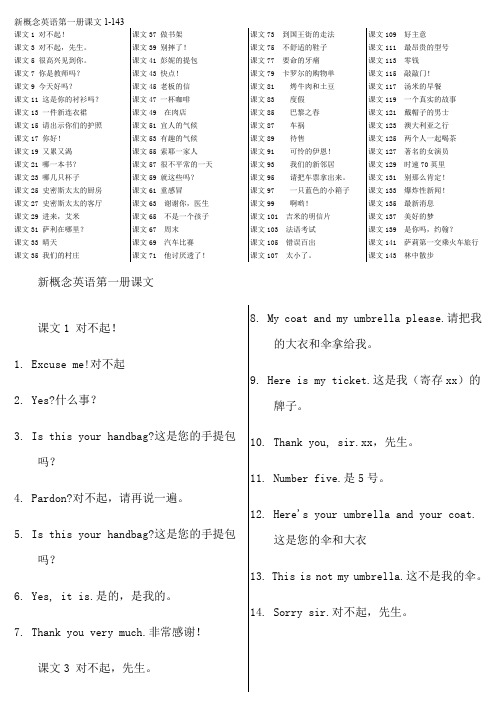
课文1 对不起!课文3 对不起,先生。
课文5 很高兴见到你。
课文7 你是教师吗?课文9 今天好吗?课文11 这是你的衬衫吗?课文13 一件新连衣裙课文15 请出示你们的护照课文17 你好!课文19 又累又渴课文21 哪一本书?课文23 哪几只杯子课文25 史密斯太太的厨房课文27 史密斯太太的客厅课文29 进来,艾米课文31 萨利在哪里?课文33 晴天课文35 我们的村庄课文37 做书架课文39 别摔了!课文41 彭妮的提包课文43 快点!课文45 老板的信课文47 一杯咖啡课文49 在肉店课文51 宜人的气候课文53 有趣的气候课文55 索耶一家人课文57 很不平常的一天课文59 就这些吗?课文61 重感冒课文63 谢谢你,医生课文65 不是一个孩子课文67 周末课文69 汽车比赛课文71 他讨厌透了!课文73 到国王街的走法课文75 不舒适的鞋子课文77 要命的牙痛课文79 卡罗尔的购物单课文81 烤牛肉和土豆课文83 度假课文85 巴黎之春课文87 车祸课文89 待售课文91 可怜的伊恩!课文93 我们的新邻居课文95 请把车票拿出来。
课文97 一只蓝色的小箱子课文99 啊哟!课文101 吉米的明信片课文103 法语考试课文105 错误百出课文107 太小了。
课文109 好主意课文111 最昂贵的型号课文113 零钱课文115 敲敲门!课文117 汤米的早餐课文119 一个真实的故事课文121 戴帽子的男士课文123 澳大利亚之行课文125 两个人一起喝茶课文127 著名的女演员课文129 时速70英里课文131 别那么肯定!课文133 爆炸性新闻!课文135 最新消息课文137 美好的梦课文139 是你吗,约翰?课文141 萨莉第一交乘火车旅行课文143 林中散步新概念英语第一册课文课文1 对不起!1. Excuse me!对不起2. Yes?什么事?3. Is this your handbag?这是您的手提包吗?4. Pardon?对不起,请再说一遍。
裕兴新概念英语第一册笔记:Lesson68Whatsthetime

裕兴新概念英语第一册笔记:Lesson68WhatsthetimeLesson 68 What's the time?New words and expressions:church n. 教堂dairy n. 乳品店baker n. 面包师傅grocer n. 食品杂货商church n.教堂temple 寺庙、神殿dairy n. 乳制品贩卖店baker n.面包商、面包师傅at the baker's (shop) 在面包店里bakery 面包店、面包厂grocer n.食品杂货商人、杂货店店主at the grocer's 在食品店里grocery 食品杂货店Exercise A:1.I was at / church on Sunday.2. I was at the office on Monday.3.My son was at / school on Tuesday.4. My wife was at the butcher's on Wednesday.5. She was at the grocer's on Thursday.6. My daughter was in the country on Friday. 7.I was at / home on Saturday.Exercise B:he / church / SundayWhen was he at church?He was at church on Sunday.1. Tom/ the hairdresser's / ThursdayWhen was Tom at the hairdresser's?He was at the hairdresser's on Thursday.2. Mrs. Jones / the butcher's/ WednesdayWhen was Mrs. Jones at the butcher's?She was at the butcher's on Wednesday. 3. he / home / SundayWhen was he at home?He was at home on Sunday.4. Penny/ the baker's / FridayWhen was Penny at the baker's?She was at the baker's on Friday.5. Mrs. Williams / the grocer's / MondayWhen was Mrs. Williams at the grocer's?She was at the grocer's on Monday.6. Nicola / the office /TuesdayWhen was Nicola at the office?She was at the office on Tuesday.Exercise C:1. 1月1日你在什么地方?Where were you on January 1st?我在教堂做礼拜。
新概念英语笔记

新概念英语笔记Lesson 1--- lesson 101、Excuse me 打扰一下 =do not punish sb =let sb off(放某人一马)。
2、他非常感谢我 He thanks me very much.(very much 修动词)= He gives me so thanks.(so thanks 连用)3、book:书n 预订v4、watch :n 手表 v 观看,注视5、dress:n 连衣裙 v化妆be dressed in = wear=have on 今天她穿了一件新裙子。
Today she is dressed in a new skirt.Today she wears a new skirt.Today she has on a new skirt.6、Is this your handbag?=Is this handbag yours.7、pardon = I beg your pardon?请再说一遍。
8、你是多少号?①What,s your number? =②What,s the number of you?= ③what number are you?9、他是我们的英语老师。
He is our English teacher.=He teaches us English.=we learn English from him.10、Here is my ticker(倒装) 正常句式:My ticket is here.11、here is …..强调地点this is ….(指示)12、This is not my umbrella =This umbrella is not mine.13、I thing …. 我认为….(后接从句)你认为怎么样? What dou you think of sth/ doing sth14 、Where is she ? Do you know?合一句为:Do you know where she is ?(Do you know+特殊疑问词+陈述语序)15、练习:She is twelve. How old is she ?=What is her age?She is in Class Four Grade One . what class is she in? She is Number Two. ①What number is she ?= ②what is her bumber?=③What,s the number of her?16、good adi;好的; n goods 货物货品比较级:better 最高级the best 副词: wellbe good at 擅长接名词(sth)或动名词(doing sth)17、中国China 中国人,中国的,语文 Chinese日本 Japan 日本人日本的日语 Japanese法国France 法国人法国的法语 French德国Germany 德国人德国的德语 German韩国 Korea 韩国人韩国的韩语 Korean丹麦丹麦人西班牙西班牙语俄罗斯 Russia 俄罗斯人 Russian荷兰 Holland 荷兰人 Dutch18、make sb do sth 让某人做某事(相当于Let)Make up 化妆 make up for 弥补…过失下定决心,拿定主意 make up one,s mind它是什么牌子的. What make is it ?19、她是法国人。
(完整)新概念英语第一册详细讲解
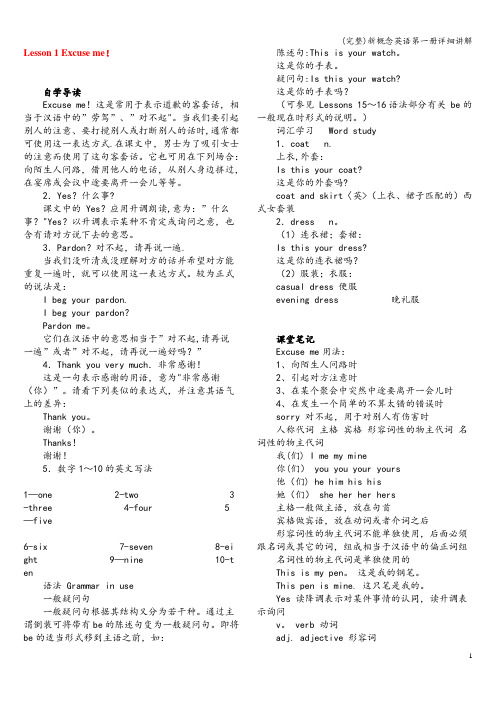
Lesson 1 Excuse me!自学导读Excuse me!这是常用于表示道歉的客套话,相当于汉语中的”劳驾”、”对不起"。
当我们要引起别人的注意、要打搅别人或打断别人的话时,通常都可使用这一表达方式.在课文中,男士为了吸引女士的注意而使用了这句客套话。
它也可用在下列场合:向陌生人问路,借用他人的电话,从别人身边挤过,在宴席或会议中途要离开一会儿等等。
2.Yes?什么事?课文中的 Yes?应用升调朗读,意为:”什么事?"Yes?以升调表示某种不肯定或询问之意,也含有请对方说下去的意思。
3.Pardon?对不起,请再说一遍.当我们没听清或没理解对方的话并希望对方能重复一遍时,就可以使用这一表达方式。
较为正式的说法是:I beg your pardon.I beg your pardon?Pardon me。
它们在汉语中的意思相当于”对不起,请再说一遍”或者”对不起,请再说一遍好吗?”4.Thank you very much.非常感谢!这是一句表示感谢的用语,意为"非常感谢(你)”。
请看下列类似的表达式,并注意其语气上的差异:Thank you。
谢谢(你)。
Thanks!谢谢!5.数字1~10的英文写法1—one 2-two 3 -three 4-four 5—five6-six 7-seven 8-ei ght 9—nine 10-t en语法 Grammar in use一般疑问句一般疑问句根据其结构又分为若干种。
通过主谓倒装可将带有be的陈述句变为一般疑问句。
即将be的适当形式移到主语之前,如:陈述句:This is your watch。
这是你的手表。
疑问句:Is this your watch?这是你的手表吗?(可参见 Lessons 15~16语法部分有关 be的一般现在时形式的说明。
)词汇学习 Word study1.coat n.上衣,外套:Is this your coat?这是你的外套吗?coat and skirt〈英>(上衣、裙子匹配的)西式女套装2.dress n。
裕兴新概念英语第一册笔记(完整版)
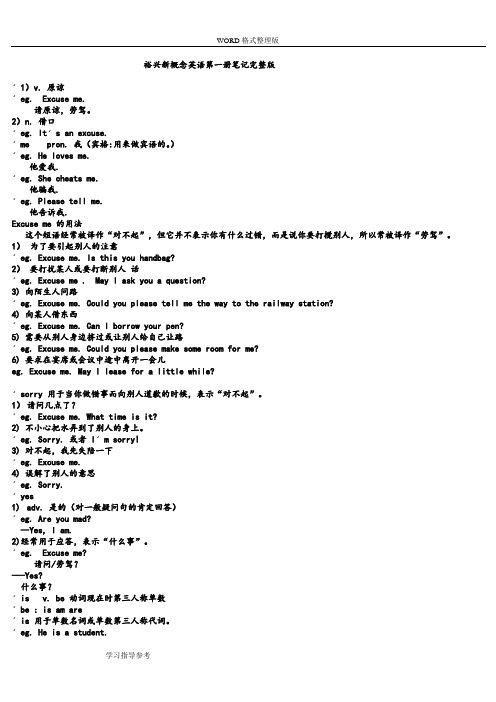
裕兴新概念英语第一册笔记完整版΄1)v. 原谅΄eg. Excuse me.请原谅,劳驾。
2)n. 借口΄eg. It΄s an excuse.΄me pron. 我(宾格:用来做宾语的。
)΄eg. He loves me.他爱我.΄eg. She cheats me.他骗我.΄eg. Please tell me.他告诉我.Excuse me 的用法这个短语经常被译作“对不起”,但它并不表示你有什么过错,而是说你要打搅别人,所以常被译作“劳驾”。
1)为了要引起别人的注意΄eg. Excuse me. Is this you handbag?2)要打扰某人或要打断别人话΄eg. Excuse me . May I ask you a question?3) 向陌生人问路΄eg. Excuse me. Could you please tell me the way to the railway station?4) 向某人借东西΄eg. Excuse me. Can I borrow your pen?5) 需要从别人身边挤过或让别人给自己让路΄eg. Excuse me. Could you please make some room for me?6) 要求在宴席或会议中途中离开一会儿eg. Excuse me. May I lease for a little while?΄sorry 用于当你做错事而向别人道歉的时候,表示“对不起”。
1)请问几点了?΄eg. Excuse me. What time is it?2) 不小心把水弄到了别人的身上。
΄eg. Sorry. 或者 I΄m sorry!3) 对不起,我先失陪一下΄eg. Excuse me.4) 误解了别人的意思΄eg. Sorry.΄yes1)adv. 是的(对一般疑问句的肯定回答)΄eg. Are you mad?--Yes, I am.2)经常用于应答,表示“什么事”。
新概念第一册 Lesson 68(课堂PPT)

Homework
1. 背诵Lesson 68的课文。 2. 背诵Lesson 68的单词。 3. 做练习册Lesson68部分。
20
6
知识点讲解
(2)表示“在星期几”或“在星期几的早上、中午、晚上”等,须用介词on。 例如: We don't go to school on Saturday or Sunday. 我们星期六和星期天不上学。 What time do you get up on weekdays? 你在平日什么时候起床? I heard this story on Saturday morning. 我是在星期六的早晨听到这个故事的。
14
练习
16._______summer 17._______ a cold day 18.______Easter 19.______midnight 20.______weekend 21. ______May,1999 22. ________May15th,1999 23. _______lunch
7
知识点讲解
(3)表示“在某一节日”或者“在某人的生日”时,须用介词on。例如: We usually eat moon cakes on Mid-autumn Festival. 我们通常在中秋节吃月饼。 Mr Hu received a card on Teachers' Day. 胡老师在教师节那天收到了一张卡片。 I got a gift on my birthday. 在我生日那天,我得到了一个礼物。 特别注意: Teachers' Day的写法。
Don't watch TV too much in the evening. 晚上看电视不要太多。 I often get up early in the morning.我经常早上起床很早。
裕兴新概念英语第一册笔记:Lesson 69 The car race

Lesson 69 The car raceNew words and expressions:year n.年race n.比赛town n.城镇crowd n. 人群stand v.站立exciting adj. 使人激动的just adv. 正好,恰好finish n. 结尾,结束winner n.获胜者behind prep.在……之后way n.路途year1) n.年常与 this, last, next, every 等词连用当作副词this year 今年the year before last 前年the year after next 后年year after year 年复一年2)岁数基数词 + year(s)eg. My best friend's grandmother is eighty-nine years old.我最好朋友的奶奶已经89岁了。
race n.赛跑,竞赛a boat race 划船比赛start a race 开始赛跑run a race with sb 与某人赛跑arm's race 军备竞赛rat race 激烈的竞争,疯狂的角逐town n.城镇city 城市eg. Beijing is a big city. 北京是个大都市。
village 乡村eg. Our village is in the valley. 我们的村庄在山谷里。
Chinatown 唐人街hometown 家乡crowd n. 人群a crowd of children 一群小孩crowded adj.拥挤的a crowded city 拥挤的城市a crowded hail 拥挤的大厅a crowded train 拥挤的火车be crowded with 堆(挤)满了eg. The room is crowded with people.stand v.1)站立,起立eg. We were standing on the right. 我们当时站在右边。
新概念英语第一册Lesson68(共37张PPT).pptx

What the time?
It’s one fifty.
What the time?
It’s one fifty-five.
When were you at church?
I was at church on Sunday.
When was Tom at hairdresser’s?
He was at the hairdresser’s on Thursday.
Were you at school on Sunday, January 1st?
Yes, I was. / No, I wasn’t.
Were you at church on Sunday, January 1st?
Yes, I was. / No, I wasn’t.
Was she at church on Sunday, January 1st?
When were you at church?
I was there on Sunday, 1st January.
It’s one twenty-five.
What the time?
It’s one thirty.
What the time?
It’s one thirty-five.
What the time?
It’s one forty.
What the time?
It’s one forty-five.
Yes, she was. / No, she wasn’t.
Were you at church on January 1st?
I wasn’t at church on January 1st. I was at church on January 1st.
裕兴新概念英语第一册笔记:Lesson 62 What's the matter with them

Lesson 62What's the matter with them?What must they do?New words and expressions:headache n.头痛aspirin n.阿斯匹林earache n.耳痛toothache n.牙痛dentist n.牙医stomachache n.胃痛medicine n.药temperature n.温度flu n.流行性感冒measles n.麻疹mumps n.腮腺炎dentist n.牙医vet 兽医surgeon 外科医生temperature n.温度high temperature 高温low temperature 低温have a temperature 发烧take one's temperature 量体温Exercise A:Examples:I have a headache.He has a headache.I must stay at home.He must stay at home.1. I have a cold.He has a cold.2. I can't go to work.He can't go to work.3. I am not well.He is not well.4. I feel ill.He feels ill.5. I must see a doctor.He must see a doctor.6. I do not like doctors.He does not like doctors.Text:She has a headache.So she must take an aspirin.George has an earache.So he must see a doctor.He has a toothache.So he must see a dentist.Jane has a stomachache.So she must take some medicine.Sam has a temperature.So he must go to bed,Dave has flu.So he must stay in bed.Jimmy has measles.So we must call the doctor.Susan has mumps.So we must call the doctor.Exercise B:Example:Jimmy/a stomachache)/a headache /take an aspirin --- What's the matter with Jimmy?Does he have a stomachache?--- No, he doesn't have a stomachache.He has a headache.So he must take an aspirin.1. Elizabeth/(an earache)/a headache /take an aspirin --- What's the matter with Elizabeth?Does she have an earache?--- No, she doesn't have an earache.She has a headache.So she must take an aspirin.2. George/(a headache) / an earache / see a doctor--- What's the matter with George?Does he have a headache?--- No, he doesn't have a headache.He has an earache.So he must see a doctor.3. Jim/a stomachache)/a toothache /see a dentist--- What's the matter with Jim?Does he have a stomachache?--- No, he doesn’t have a stomachache.He has a toothache.So he must see a dentist.4. Jane/(a toothache)/ a stomachache/take some medicine--- What's the matter with Jane? Does she have a toothache? --- No, she doesn't have a toothache.She has a stomachache.So she must take some medicine.5. Sam/(a stomachache)/a temperature /go to bed--- What's the matter with Sam?Does he have a stomachache?--- No, he doesn't have a stomachache.He has a temperature.So he must go to bed.6. Dave/(a headache) /flu/stay in bed--- What’s the matter with Dave?Does he have a headache?--- No, he doesn't have a headache.He has flu.So he must stay in bed.7. Jimm y/ (a headache) measles /we…call the doctor--- What's the matter with Jimmy?Does he have a headache?--- No, he doesn't have a headache.He has measles.So we must call the doctor.8. Susan/(an earache) /mumps /we…call the doctor --- What's the matter with Susan?Does she have an earache?--- No, she doesn't have an earache.She has mumps.So we must call the doctor.小结:疾病前加不定冠词:a cold 感冒a headache 头痛a sore throat 嗓子痛复数形式的疾病名称前面不用冠词:measles 麻疹mumps 腮腺炎不可数名词的疾病前面不用冠词:flu 流行性感冒。
新概念英语第一册文本(pdf)
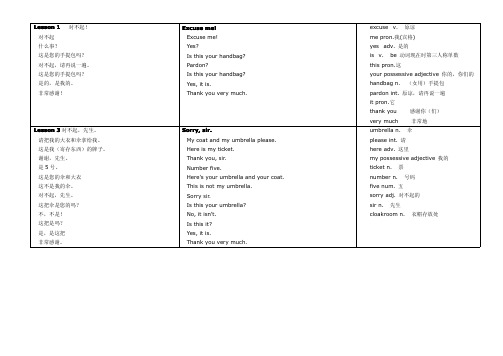
Lesson129时速70英里安:瞧,加里!那个警察正朝你挥手呢。
他要你停下来。
警察:你认为你现在是在哪儿?在赛车道上吗?你刚才一定是以每小时70英里的速度开车。
加里:我不会开得那么快的。
警察:我是以第小时80英里的速度赶上你的。
警察:难道你没看见限速牌吗?加里:恐怕我没有看见,警官。
我一定思想开小差了。
安:警官,他思想没有开小差。
我刚才正告诉他开慢点。
安里:所以我才没看见那牌子。
警察:让我看一看你的驾驶执照。
警察:这次我就不罚你款了。
但你最好不要再开得这样快。
加里:谢谢您。
我以后一定会多加注意。
安:加里,我刚才叫你开慢点吧。
加里:你总是叫我开慢点,亲爱的。
安:好啦,下次你最好还是听从我的劝告!Seventy miles an hourANN:Look,Gary!That policeman's waving to you.He wants you to stop.POLICEMAN:Where do you think you are?On a race track?You must have been driving at seventy miles an hour.GARY:I can't have been.POLICEMAN:I was doing eighty when I overtook you.POLICEMAN:Didn't you see the speed limit?GARY:I'm afraid I didn't,officer.I must have been dreaming.ANN:He wasn't dreaming,officer.I was telling him to drive slowly.GARY:That's why I didn't see the sign.POLICEMAN:Let me see your driving licence.POLICEMAN:I won't charge you this time.But you'd better not do it again!GARY:Thank you.I'll certainly be more careful.ANN:I told you to drive slowly,Gary.GARY:You always tell me to drive slowly,darling.ANN:Well,next time you'd better take my advice!wave v.招手track n.跑道mile n.英里overtake(overtook,overtaken)v.从后面超越,超车speed limit限速dream v.做梦,思想不集中sign n.标记,牌子driving licence驾驶执照charge v.罚款darling n.亲爱的(用作表示称呼)Lesson131别那么肯定!马丁:加里,今年你们打算去哪里度假?加里:我们可能到国外去,但我不敢肯定。
裕兴新概念英语第一册笔记:Lesson 74 What did they do

Lesson 74 What did they do?New words and expressions:hurriedly adv. 匆忙地cut v.割,切thirstily adv. 口渴地go v.走greet v.问候,打招呼hurriedly adv. 匆忙地eg. He went out of his office hurriedly.他匆匆忙忙地走出了他的办公室。
cut v. 割,切eg. Be careful! Don't cut yourself.cut…into pieces 把……切成小片/条eg. Cut the potato into pieces.把土豆切成小片/条。
thirstily adv. 口渴地thirsty adj.口渴的hungry adj.饿的hungrily adv. 饿地go v.走wentgreet v.问候,打招呼greet sb 与某人打招呼eg. We use the phrase 'good morning' to greet others in the morning.Grammar:副词的作用是补充动词的意义。
通过修饰动词我们知道有关句中某个动作的情况,也就是告诉我们某动作是如何、何时、何地等发生或进行的。
副词可以是单个的词(如slowly 或词组(very well)。
单一副词既有以-ly结尾的如quickly,也有不以-ly结尾的如 fast。
形容词向副词的转换一般遵循3个规则:1)在形容词后面直接加-ly,如:quick - quicklyhurried - hurriedlypleasant - pleasantlywarm - warmly2)以辅音字母加y结尾的形容词,则把-y 改成-i,再加-ly,如: Thirsty - thirstilyHappy - happily3) 形容词与副词形式相同:late - late(adj.) be late for school(adv.) come home lateFast - fast(adj.) a fast car(adv.) run fastHard - hard(adj.) hard work(adv.) work hardWell - well(adj.) I'm well.(adv.) I swim well.Exercise A:Example:She smiled pleasantly. (pleasant)1.He read the phrase slowly.(slow)2. He worked lazily.(lazy)3. He cut himself badly.(bad)4. He worked carefully. (careful)5. The door opened suddenly.(sudden)Exercise B:1.他的爸爸今天早晨匆忙地刮胡子,结果把自己严重地割伤了。
新概念英语第一册lesson67-68
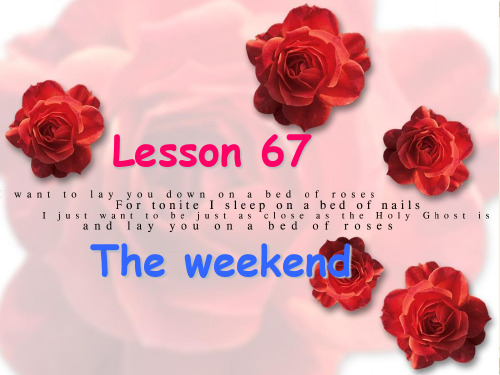
2、以不发音的字母e结尾的动词,直接加d。 hoped,lived, believed 3、辅音字母加y结尾的单词,要把y变i加ed
studied,worried,
4、重读闭音节单词需双写最后一个辅音字 母,再加ed。 fitted ,stopped, shipped
5、有些动词不符合上面的规则,需
spend +时间/金钱 +(in) doing sth. The manager spent 2 hours(in) explaining the plan at the meeting. 在会上,经理用两个小时来解释这个计划
spend,cost,afford,take,pay的区别
• cost 表示物的售价,物做主语 I bought a new necklace, it costs me 2000 dollars.
以单独做谓语,如:played 等)
例如: They were happy. He played football. You did your homework.
动词的过去式变化规则
1、一般的动词后面直接加-ed
① 清辅音后面加ed,读[t]
asked
② 浊辅音或元音后面加ed,读[d] cleaned ③ d/t +ed [id] dusted
前面一定要加定冠词the
③ adj. 乡下的;乡村风味的 I prefer country life to life in the city. 乡村生活与城市生活相比,我更喜欢乡村生活。 After nearly thirty years in the city, he’s still country. 他在城里住了将近三十年,可还是土气十足。
裕兴新概念英语第一册第7-9课详细笔记
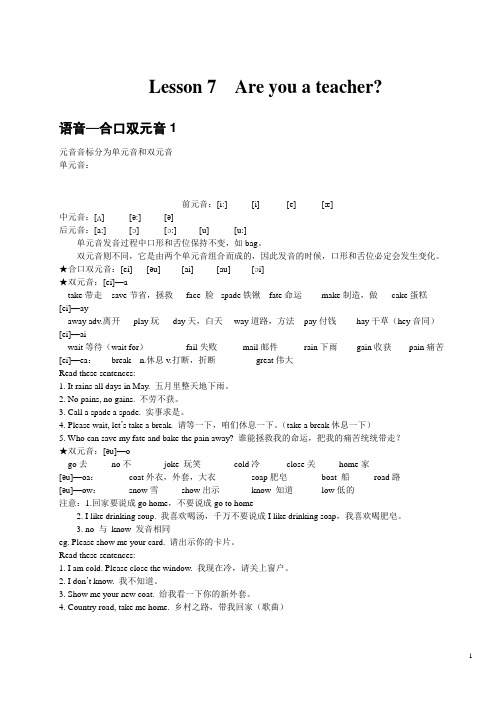
Lesson 7 Are you a teacher?语音—合口双元音1元音音标分为单元音和双元音单元音:前元音:[i:] [i] [e] [æ]中元音:[ʌ] [ə:] [ə]后元音:[a:] [ɔ] [ɔ:] [u] [u:]单元音发音过程中口形和舌位保持不变,如bag。
双元音则不同,它是由两个单元音组合而成的,因此发音的时候,口形和舌位必定会发生变化。
★合口双元音:[ei] [əu] [ai] [au] [ɔi]★双元音:[ei]—atake带走save节省,拯救face 脸spade铁锹fate命运make制造,做cake蛋糕[ei]—ayaway adv.离开play玩day天,白天way道路,方法pay付钱hay干草(hey音同)[ei]—aiwait等待(wait for)fail失败mail邮件rain下雨gain收获pain痛苦[ei]—ea:break n.休息v.打断,折断great伟大Read these sentences:1. It rains all days in May. 五月里整天地下雨。
2. No pains, no gains. 不劳不获。
3. Call a spade a spade. 实事求是。
4. Please wait, let’s take a break. 请等一下,咱们休息一下。
(take a break休息一下)5. Who can save my fate and bake the pain away? 谁能拯救我的命运,把我的痛苦统统带走?★双元音:[əu]—ogo去no不joke 玩笑cold冷close关home家[əu]—oa:coat外衣,外套,大衣soap肥皂boat 船road路[əu]—ow:snow雪show出示know 知道low低的注意:1.回家要说成go home,不要说成go to home2. I like drinking soup. 我喜欢喝汤,千万不要说成I like drinking soap,我喜欢喝肥皂。
- 1、下载文档前请自行甄别文档内容的完整性,平台不提供额外的编辑、内容补充、找答案等附加服务。
- 2、"仅部分预览"的文档,不可在线预览部分如存在完整性等问题,可反馈申请退款(可完整预览的文档不适用该条件!)。
- 3、如文档侵犯您的权益,请联系客服反馈,我们会尽快为您处理(人工客服工作时间:9:00-18:30)。
Lesson 68 What's the time?
New words and expressions:
church n. 教堂
dairy n. 乳品店
baker n. 面包师傅
grocer n. 食品杂货商
church n.教堂
temple 寺庙、神殿
dairy n. 乳制品贩卖店
baker n.面包商、面包师傅
at the baker's (shop) 在面包店里
bakery 面包店、面包厂
grocer n.食品杂货商人、杂货店店主
at the grocer's 在食品店里
grocery 食品杂货店
Exercise A:
1.I was at / church on Sunday.
2. I was at the office on Monday.
3.My son was at / school on Tuesday.
4. My wife was at the butcher's on Wednesday.
5. She was at the grocer's on Thursday.
6. My daughter was in the country on Friday. 7.I was at / home on Saturday.
Exercise B:
he / church / Sunday
When was he at church?
He was at church on Sunday.
1. Tom/ the hairdresser's / Thursday
When was Tom at the hairdresser's?
He was at the hairdresser's on Thursday.
2. Mrs. Jones / the butcher's/ Wednesday
When was Mrs. Jones at the butcher's?
She was at the butcher's on Wednesday. 3. he / home / Sunday
When was he at home?
He was at home on Sunday.
4. Penny/ the baker's / Friday
When was Penny at the baker's?
She was at the baker's on Friday.
5. Mrs. Williams / the grocer's / Monday
When was Mrs. Williams at the grocer's?
She was at the grocer's on Monday.
6. Nicola / the office /Tuesday
When was Nicola at the office?
She was at the office on Tuesday.
Exercise C:
1. 1月1日你在什么地方?
Where were you on January 1st?
我在教堂做礼拜。
I was at church.
你什么时候在教堂做礼拜?
When were you at church?
我下午1点1刻在教堂做礼拜。
I was at church at a quarter past one in the afternoon.
I was at church at fifteen past one in the afternoon. 2.星期一的时候他在哪里?
Where was he on Monday?
他在学校上学。
He was at school.
3. 我下午5:40分在办公室里。
I was at the office at five forty in the afternoon.
I was at the office at twenty to six in the afternoon. 4.他们6月23日在面包店。
They were at the baker's on June 23rd.。
